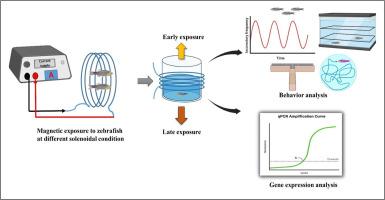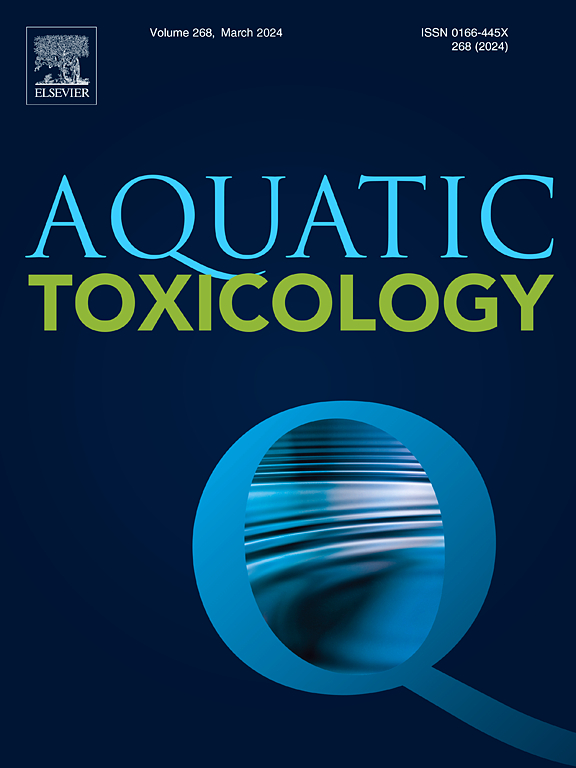用于探测静磁场诱导斑马鱼生理和行为破坏的螺线管组件的研制
IF 4.3
2区 环境科学与生态学
Q1 MARINE & FRESHWATER BIOLOGY
引用次数: 0
摘要
磁场在自然和人工环境中都是普遍存在的,但它们对器官系统的生物学影响仍不完全清楚。我们设计了一个定制的螺线管组件,使斑马鱼能够原位暴露于静态磁场中,并系统地检测了对基因表达和行为的下游影响。短期暴露导致与应激反应、线粒体功能、细胞增殖和心脏、大脑和肝脏神经活动相关的关键分子标记的表达发生协调变化。这些分子改变伴随着明显的行为改变,包括焦虑样行为增加、社交互动中断、运动改变和认知测试中的表现受损。总的来说,我们的研究结果表明,磁场暴露扰乱了斑马鱼的全身生理稳态,反映在分子和行为失调上。除此之外,由于磁场在MRI等医疗仪器中的临床影响,特别是在癌症患者中,对其全身影响的理解变得越来越重要。这项研究为评估磁场的生物学后果提供了一个基础平台,并提出了关于磁场对生物体健康和环境适应的更广泛影响的重要问题。本文章由计算机程序翻译,如有差异,请以英文原文为准。

Development of solenoidal assembly for probing static magnetic field-induced physiological and behavioral disruptions in zebrafish
Magnetic fields are pervasive in both natural and artificial environments, yet their biological impact across organ systems remains incompletely understood. We designed a custom solenoidal assembly to enable in-situ exposure of zebrafish to static magnetic fields and systematically examined the downstream effects on gene expression and behavior. Short-term exposure led to coordinated changes in the expression of key molecular markers associated with stress response, mitochondrial function, cellular proliferation, and neural activity across the heart, brain, and liver. These molecular alterations were accompanied by pronounced behavioral changes, including increased anxiety-like behavior, disrupted social interactions, altered locomotion, and impaired performance in cognitive assays. Collectively, our findings suggest that magnetic field exposure perturbs systemic physiological homeostasis in zebrafish, reflected through molecular and behavioral dysregulation. Besides this, because of the clinical impact of magnetic fields in medical instrumentation such as MRI, in particular in cancer patients, the understanding of their systemic impact becomes more and more relevant. This study provides a foundational platform for assessing the biological consequences of magnetic fields and raises important questions about their broader impact on organismal health and environmental adaptation.
求助全文
通过发布文献求助,成功后即可免费获取论文全文。
去求助
来源期刊

Aquatic Toxicology
环境科学-毒理学
CiteScore
7.10
自引率
4.40%
发文量
250
审稿时长
56 days
期刊介绍:
Aquatic Toxicology publishes significant contributions that increase the understanding of the impact of harmful substances (including natural and synthetic chemicals) on aquatic organisms and ecosystems.
Aquatic Toxicology considers both laboratory and field studies with a focus on marine/ freshwater environments. We strive to attract high quality original scientific papers, critical reviews and expert opinion papers in the following areas: Effects of harmful substances on molecular, cellular, sub-organismal, organismal, population, community, and ecosystem level; Toxic Mechanisms; Genetic disturbances, transgenerational effects, behavioral and adaptive responses; Impacts of harmful substances on structure, function of and services provided by aquatic ecosystems; Mixture toxicity assessment; Statistical approaches to predict exposure to and hazards of contaminants
The journal also considers manuscripts in other areas, such as the development of innovative concepts, approaches, and methodologies, which promote the wider application of toxicological datasets to the protection of aquatic environments and inform ecological risk assessments and decision making by relevant authorities.
 求助内容:
求助内容: 应助结果提醒方式:
应助结果提醒方式:


